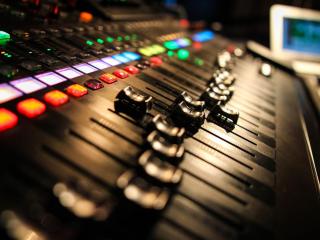
If you have decided to attend audio engineering school, kudos to you for chasing your dream! So many people out there wish they could become skillful enough to make a career out of something they truly love, and with this decision, you are one step closer to attaining what so many people will only dream of in their lifetime.
However, before signing up and jumping right into your education, you may have some questions regarding the field of audio engineering such as what the employment outlook might currently look like or what the future may hold for those employed as audio engineers.
Today, we will look at some of the key information surrounding employment as an audio engineer such as job description, education and training requirements, and salary expectations.
Job Descriptions for Audio Engineers
If you are an audio engineer searching for employment, it is important to know that your job title comes in many forms.
Searching for terms such as recording engineer, sound engineer, mixing engineer, audio operator, production assistant, sound editor, or Foley engineer may help you find more employment opportunities.
Audio engineers generally work on music productions and oversee the entire process of recording high-quality audio. Some of your job duties might include:
- Setting up, operating, and managing equipment such as amplifiers, microphones, tape recorders and digital recorders for television, radio broadcasts, concerts, and recording sessions.
- Management of entire recording sessions including amplifying, recording, and mixing a final project’s audio components.
- Adding sound effects and minimizing interference using a variety processing equipment such as mixing boards, equalizers, noise filters, analog-to-digital converters and digital editing software.
Audio engineers work at multimedia or post-production facilities, musical recording studios, movie studios, TV stations, concert venues, theaters, and at on-set locations.
Education and Training
No formal education is necessarily required to become employed as an audio engineer, although any education or specialized training you receive will only increase your chances of becoming employed and making a decent audio engineering salary.
Education
Some employers may require a bachelor’s or associate’s degree in audio engineering or communications, or a vocational certificate from a reputable recording arts school.
Approximately 31% of audio engineers have a high school diploma, another 31% have some college education but no degree, and 22% have an associate's degree. It is suggested that you at least have a solid foundation in computer work because audio engineering is based so heavily in software manipulation.
Here are some of the things you may learn while getting an education in audio engineering:
- Music theory
- Live sound reinforcement
- Aural perception
- Studio recording
- Sound manipulation
- Multi-track mixing
- Video and film scoring
Training
Many schools offering education in the field of audio engineering will also provide hands-on training or internship opportunities to improve your overall skill set. This is thought to be the best way to learn the field of audio engineering and the most important qualification to potential employers.
Gaining firsthand experience, whether via school instruction or on the job, will help project you into better employment opportunities. Many entry-level audio engineers work in smaller markets first until they gain the necessary experience required to work for a larger, more successful studio.
In the end, it is the experience that will get you ahead in the music industry. Understanding theory helps to make you a better audio engineer, however, knowing how to use the equipment used on a daily basis in a studio is much more important.
Audio Engineering Employment Outlook
According to the U.S. Bureau of Labor Statistics, the field of audio engineering is expected to increase by nine percent over the next 10 years.
Audio engineering is thought to be a promising career in the United States with approximately 69,000 people employed in related occupations as of 2012.
Competition is highest in large, metropolitan states such California and New York, both with over 3,000 employed audio engineers. It is suggested audio engineers seek employment in smaller markets where supply does not exceed demand.
Depending on prior experience, the audio engineering salary ranges from 23K-93K annually; motion picture and video industries typically offer the highest wages. You can check your state’s average audio engineering salary here.
Final Thoughts
Audio engineering is a solid career choice for those interested in employment in the music industry. It offers favorable growth statistics, a decent salary range that increases with experience, and allows you to turn your passion into a dream job.
If you are looking for a reputable audio engineering school to attend that will provide you the required skills to make it in the competitive audio engineering industry, consider the Sheffield Institute for Recording Arts in Baltimore, MD. This vocational school has a fast paced curriculum, is affordable to attend, and offers both theory based and exceptional hands-on training with specialization opportunities.



